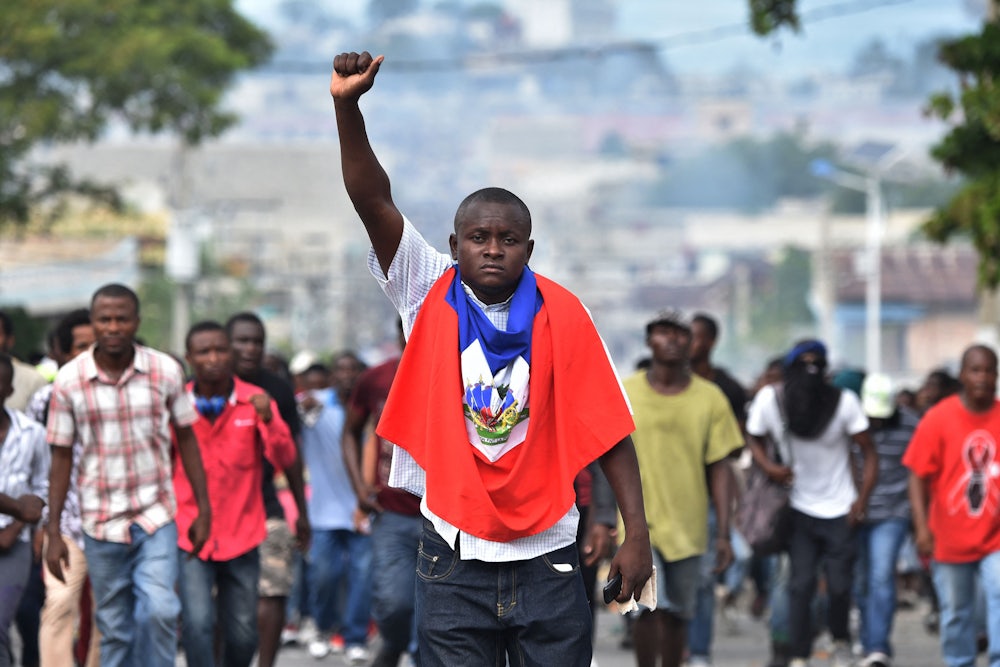As long as I have been working on Haiti, I have been forced to respond to friends and acquaintances who come up to me and ask, in true concern, “Why is Haiti like that?” And for just as long, I’ve had to explain about the debt Haiti paid to France over almost its entire history as a free republic, and how that changed the course of Haitian history, destroyed the country’s young economy, and put it for more than a century on a much weaker footing compared to the rest of the countries of the Caribbean and Latin America.
For decades and longer, people who write and think about Haiti have been trying to convince the mainstream media to include Haitian history and its ramifications in their reports on Haiti. But this rarely happened. Not only did Haiti’s revolution and its torrid history with the slave-holding world go unmentioned in most news stories and features, but the effects of foreign policy on the country were also barely touched on, except when the United States, say, could crow about the fall of a dictator, aid for earthquake victims, or a successful democratic election. Indeed, in my long past with Haiti, I often saw mainstream reporters take their news approach directly from sources in the State Department, on the grounds, it seemed, that really, these were the people who knew. Instead of explaining the history behind it, the mantra on Haiti in news reports was simply “the poorest country in the Western hemisphere,” sans commentaire.
It was almost impossible, in real time, to get the established news media to include the fact that the dictator ousted in 1986, Jean-Claude (Baby Doc) Duvalier, and even more, his brutal father, François (Papa Doc) Duvalier, had been supported by the U.S. for years before the son’s departure was abetted by the Americans. For the longest time, mainstream news outlets chose to look away when it was discovered that post-2010 earthquake funds for Haiti bypassed the Haitian government and largely bypassed also the Haitian victims, often simply disappearing into American pockets or failing to materialize. They also overlooked the fact that the successful 1990 election, of which the U.S. was so proud, resulted in a popular and progressive Haitian president taking office who was then ousted not once but twice in extractions many reporters suspected were greenlighted by the U.S.
That Haitian president, Jean-Bertrand Aristide, was one of the first Black figures to raise a loud voice in favor of reparations for his people. Although he could have demanded reparations for all the unpaid labor and vast suffering of the Haitian people, which enriched both their French masters and France itself, he opted instead to ask for payback from France—for the “independence debt” that Haitians began paying to France in the 1820s and that, when finally totted up, with interest, comes to a figure somewhere between $21 billion and $115 billion, in current dollars. The “debt” repayments were not only for plantation fields and buildings burned in the Haitian Revolution of 1791–1804 but also for the loss to French masters of the Haitians themselves; repayment, in other words, for the revolutionaries’ own bodies. It was not long after Aristide brought up this issue, in public, with accompanying evidence and accounting, that he was ousted for the second time. At the time, the mainstream media did not include in its reports the role that his demand for reparations might have played in his fall.
So imagine the general joy among people who watch and think about Haiti, especially Haitians, when The New York Times came out this past weekend with “The Ransom,” a giant, front-page series on the independence debt, followed by a full section’s worth of long stories on various aspects of Haiti’s long past and more recent history. With much for-the-first-time crowing and self-congratulatory chest-thumping, true—but still. Sure, most gladness at this truth-telling was laced with bitterness at the Times’ long-term suppression and overlooking of Haiti’s history. But still, Haitians and Haitianists were glad to see these familiar truths (familiar to us, if not to readers of the Times) blazoned over the front page of the paper on a Sunday, and also occupying an entire section unto themselves.
It also reminded us that still today, nothing is considered true until the Times says it is.
There can be little doubt, also, that without the Black Lives Matter movement’s pressure to awaken power centers here in the U.S. to the ongoing historical plight of Black Americans, this section would never have come into being. And also, this was a natural “folo,” as we say in newspapers, to the publication by the Times of the 1619 Project. Thank you for getting woke, NYT.
However, nowhere in the piece is there any sign of a mea culpa for past behaviors, and there should be. This paragraph in particular made me and others hoot with indignant laughter (note the natural use of the passive voice to avoid both responsibility and finger-pointing): “For more than a century, Haiti has been labeled a disaster, a basket case, a place so destitute, indebted, lacking and lawless that it needs constant saving. The assassination of the president in his bedroom, the kidnappings in the capital, the swells of Haitian migrants heading to the United States—they all point to a country in a seemingly endless vortex of despair that the world’s great powers, whether with troops or mountains of aid, have not managed to fix. But the documents and financial records reviewed by the Times in Haiti, the United States, and France show how much of Haiti’s misery has been brought by the outside world—and how often intervention has been portrayed as a helping hand.”
But who is it exactly who has portrayed Haiti that way? The New York Times, the Chicago Tribune, The Wall Street Journal, The Washington Post, and so many, many others, including all the major American television news networks—obviously with occasional exceptional, brilliant reporting. But really, they are the ones who have “labeled” Haiti “a disaster.” Why not say so in this series? Otherwise, so many people who don’t know better and who aren’t reading the critiques on Twitter will be left with the impression given by the Times that it is only their work for this package that has finally shown “how much of Haiti’s misery has been brought by the outside world—and how often intervention has been portrayed as a helping hand.” My inbox is full of notes from friends and family asking, breathlessly, “Did you see The New York Times’ exposé about the French debt?” But it’s not a scoop, and it’s not an exposé, it’s a summary of so many years of work by scholars, historians, archivists, and economists, Haitian and other, and then a deep dive by the Times into French and other archives and research resources.
All over social media, the Times’ series has sparked complaints about the many who helped the Times who are not mentioned in the credits or cited in the pieces. But that’s minor. This is how journalism works, whether those sources like it or not. Reporters talk to as many people as they can for a story like this, and they do all sorts of reading and research, and then they cite the most important sources and the ones who gave them the best quotes, and they’re careful not to plagiarize.
What’s more important is the bits of big news the Times story did reveal, and for the first time. As my colleague Jonathan Katz points out in his Substack feed, The Racket, the Times for the first time documented the precise amount Haiti ended up paying over time to France, French plantation owners, French banks, and, later, American banks. It pointed out that the Haitians’ debt payments effectively funded the construction of one of the great symbols of French liberty, the Eiffel Tower. Another fact: Although the Haitian payments were supposed to go to former owners of property in Haiti, France itself put some of the money in the state’s own coffers. So did officials of the National City Bank, who controlled Haiti’s debts in part of the 1900s and paid themselves handsome salaries out of those monies, as the Times reporting documents for the first time.
Oh and also, just one further piece of news from this series: Aristide’s ouster in 2004 was not orchestrated by Haitian rivals angered by his supposed autocratic rule, as many, including the Times and others, asserted at the time but was instead “effectively ‘a coup’” organized by France and the U.S., according to Thierry Burkhard, France’s ambassador back then, who is quoted saying so in the Times series. France’s role, Burkhard further acknowledged, was in part spurred by Aristide’s demand for debt reparation. Burkhard must be having a rough few days, while Aristide is no doubt rejoicing at a posterity rescued from long French and American disinformation.
I imagine (in fact I know) that many people at the Times, who are understandably proud of the package, the display it got, and all the work that went into it, were scratching their heads yesterday, thinking no good deed goes unpunished, as they watched Twitter explode with complaints from sources and from Haitians annoyed about lack of citation and about the Times’ openly smug delight with its revelations.
But no one should be surprised at the reaction. They are missing the context of the complaints. Haitians—including some of Haiti’s foremost historians and political scientists—have felt for years, decades, and centuries that their voices are unheard, their country ignored, their ideas and analyses about Haiti disregarded. Their own history and statehood has often been captured by others, especially the U.S., since the Marine occupation of Haiti began in 1915 (it ended in 1934, but the U.S. remained and remains a dominating power). They’re even annoyed when the country’s historic tragedy is finally given big play in The New York Times because it shows, again, how dependent their narrative is on the white man’s imprimatur, literally. If the Times says it’s true, it’s true. If not, not. Imagine how galling and destructive that is, when you remember all the years during which your useful knowledge of your own country’s past (and present) was ignored by this arbiter of truth and indeed of reality.
All the clamoring about sourcing and so forth on social media, which could seem like petty sour grapes, was really about something much bigger. It was about being overtaken in your own truth by someone else “appropriating” it as their own—in this case, about descendants of the former Haitian enslaved people having their own story taken over and waved before the world by descendants (speaking in an extenuated fashion) of those who profited from those rapacious debt payments. That’s how it felt, I think.
Will the series in the Times have any effect? Will France feel any impulse to right the historic wrong? The Haitian case is only the worst instance of France’s rapacious colonial policies because it combines the unpaid labor of generations with the hideous demands of the debt, unique for their time. But the precedent that would be set if France tried to make amends to Haiti has to trouble French officials, because the empire was big and included many slave-holding states as well as colonies whose economies were looted in various ways, in the Caribbean, Southeast Asia, West and North Africa, and many other spots around the globe.
However, according to the Times, Crédit Mutuel, a French bank that now owns Crédit Industriel et Commercial and ran Haiti’s debt payments in the late 1800s and early 1900s, intends to hire a team to examine CIC’s history in Haiti, because of the Times report. “This is sort of an awkward situation,” the head of Crédit Mutuel told the Times. But he added that it was “a matter of principle” for Crédit Mutuel’s new Haiti research team to find out whether, more than a century after ending its Haiti operations, CIC still might owe money to Haiti. Chances are if the research can be done, they’ll find it does. But would Crédit Mutuel have the will and resources to pay up, even if it’s a matter of principle? Matters of principle often are not resolved with cash but with words and gestures and apologies.
And if the bank were to move to rectify past ills, might France itself follow suit? Hard to imagine this. In 2015, France’s president, François Hollande, told a crowd in Guadaloupe, where he was attending the opening of a memorial on the slave trade, that “when I come to Haiti, I will for my part pay off the debt we have.” The crowd gave him a standing ovation. When asked for clarification a few hours later, according to the Times series, Hollande backpedaled, saying he was referring only to a “moral debt.”
Then there’s the question of how Haiti—for the moment a destitute, corrupt, gang-ridden, violence-plagued “basket case” the international community helped create, with a de facto prime minister and an unsolved presidential assassination—would deal with the arrival in the state treasury of a cool $21 billion, to pick the low ball. Millions for infrastructure building, education, health care, environmental protection, the justice system, a professional police force, electoral protections, sanitation.… Isn’t it pretty to think so?






